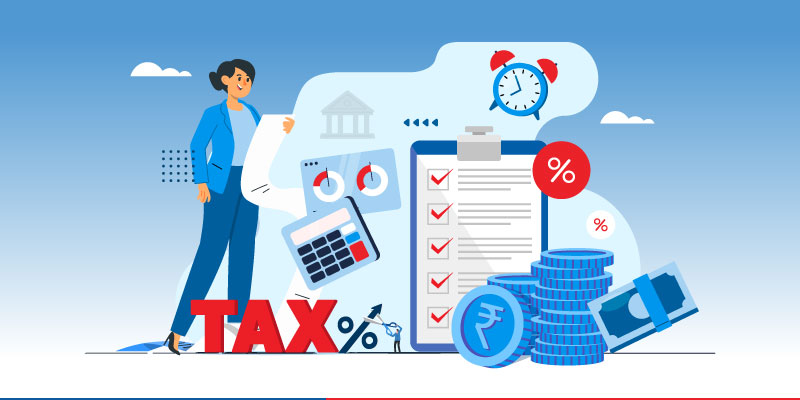What do you want to do?
Five mistakes you must avoid while investing to save income tax

Table of Content
In Indian taxation system, income tax is one of the main types of direct taxes levied by the government. It is the tax that is levied under the regulatory guidelines of CBDT (Central Board of Direct Taxes), and is imposed by the government on income generated by businesses and individuals (including HUFs or Hindu Undivided Families) within their jurisdiction. An income tax is therefore the tax that is levied on the earnest monthly salary and it varies from one taxable slab to another. Section 80C of the Income Tax Act, 1961 allows exemptions for various investments which people undertake for saving on taxes. However, while planning to invest in order to save payable income tax, there are certain common mistakes, which must be avoided. Following is a list of these mistakes that you must avoid while investing to save income tax:
1.Ignoring your specific needs and requirements:
This is one of the most common mistakes that many people make. Before making any investment decision, you must make a list of your specific needs and requirements so that the right kind of matched decisions can be taken. Therefore, it is important to not follow what the others are doing but to take care of your own financial aspirations.
2.Not choosing the right amount of investment:
Underinvestment and overinvestment are both factors that you must avoid. The amount that you to choose to invest obviously depends on the earnest monthly income. Therefore, if you choose to invest in a particular instrument, you must do so after taking due care of meeting your needs and that of your loved ones. After doing that, the surplus amount must then be invested. However, investing the surplus completely must be avoided because you have to contribute towards the basic savings corpus as well as keep emergency funds available.
3.Not exploring all options:
Sections 80C, 80G, 80D and 80CCD are various sections that offer exemptions on options that range from investments in health insurance to contributions towards certain charitable or other institutions. Therefore, you must have a clear understanding of the legal Sections under which exemptions are being offered so that you can have a better grasp of the available options.
4.Lop-sided investment portfolio:
The ideal investment portfolio must consist of both the debt and equity instruments and even hybrid instruments. This ensures stable benefits over a period of time and ensures that all your funds are not tied up in a single investment option.
5.Not taking due care of present commitments:
This means that if you have invested more than the surplus, then the present day commitments or immediate financial goals may not be duly met. Therefore, it is important that you take due care of present commitments while planning your long term investments.
HDFC Life offers several saving and investment plans that allow you to maintain security of the finances and offer market-linked returns and capital benefits.
 Term Plan Articles
Term Plan Articles
 Investment Articles
Investment Articles
 Savings Articles
Savings Articles
 Life Insurance Articles
Life Insurance Articles
 Tax Articles
Tax Articles
 Retirement Articles
Retirement Articles
 ULIP Articles
ULIP Articles
Subscribe to get the latest articles directly in your inbox
 Health Plans Articles
Health Plans Articles
 Child Plans Articles
Child Plans Articles
 Popular Calculators
Popular Calculators
 Insurance Advisor Articles
Insurance Advisor Articles
Here's all you should know about life insurance.
We help you to make informed insurance decisions for a lifetime.
HDFC Life
Reviewed by Life Insurance Experts
HDFC LIFE IS A TRUSTED LIFE INSURANCE PARTNER
We at HDFC Life are committed to offer innovative products and services that enable individuals live a ‘Life of Pride’. For over two decades we have been providing life insurance plans - protection, pension, savings, investment, annuity and health.

Popular Searches
- Term Insurance Calculator
- Investment Plans
- Investment Calculator
- Investment for Beginners
- Best Short Term Investments
- Best Long Term Investments
- 5 year Investment Plan
- savings plan
- ulip plan
- retirement plans
- health plans
- child insurance plans
- group insurance plans
- income tax calculator
- bmi calculator
- compound interest calculator
- income tax slab
- Income Tax Return
- what is term insurance
- Ulip vs SIP
- tax planning for salaried employees
- HRA Calculator
- Annuity From NPS
- Retirement Calculator
- Pension Calculator
- nps vs ppf
- short term investment plans
- safest investment options
- one time investment plans
- types of investments
- best investment options
- best investment options in India
- Term Insurance for Housewife
- Money Back Policy
- 1 Crore Term Insurance
- life Insurance policy
- NPS Calculator
- Savings Calculator
- life Insurance
- Gratuity Calculator
- Zero Cost Term Insurance
- critical illness insurance
- itc claim
- deductions under 80C
- section 80d
- Whole Life Insurance
- benefits of term insurance
- types of life insurance
- types of term insurance
- Benefits of Life Insurance
- Endowment Policy
- Term Insurance for NRI
- Term Insurance for Women
- Term Insurance for Self Employed
- Benefits of Health Insurance
- Health Insurance for Senior Citizens
- Health Insurance for NRI
- Best Term Insurance Plan for 1 Crore
- personal accident insurance
- Annuity Calculator
- Life Insurance Calculator
- Term Insurance Comparison
- Digital Life Insurance
- Child Education Planner

